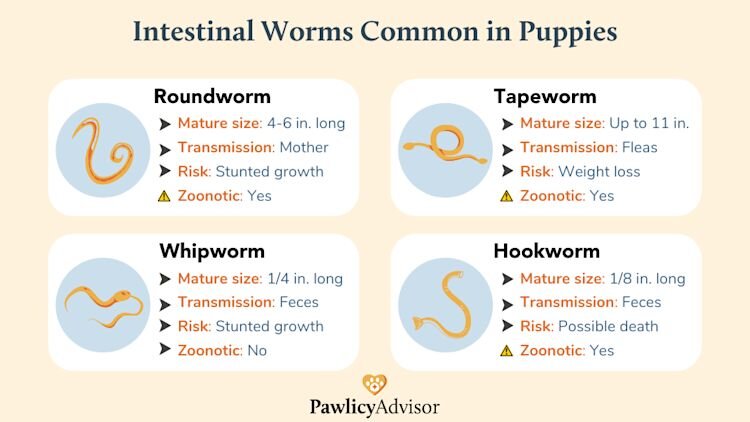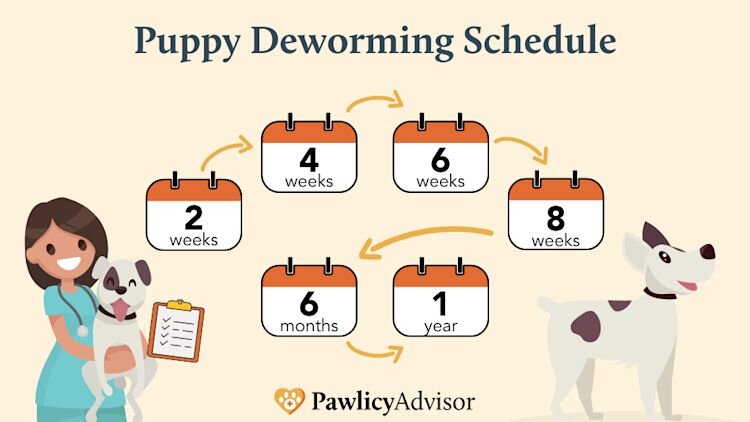Puppy Deworming Schedule: Everything You Need To Know
Small Animal Relief Veterinarian
Taking care of a puppy involves more than grooming and feeding. To ensure your little one's optimal well-being, you'll also need to have your dog dewormed on a regular basis to ensure they're free of intestinal parasites.
Worms are one of the most common causes of illness in puppies, so knowing the signs to look out for and establishing a puppy deworming schedule is very important. For pet owners concerned about the costs of potential puppy illnesses like these, puppy insurance can offer financial protection. In this post, we’re discussing which parasites require worming medication, what risks they may present, and when to start a deworming schedule for puppies so they can grow up healthy and happy.
Here’s everything you need to know about deworming puppies:
- What is puppy deworming?
- How do puppies get worms?
- What worms are common in puppies?
- What are the symptoms of worms in puppies?
- When to deworm puppies
- Deworming schedule for puppies
- How to deworm a puppy
- What happens after deworming a puppy?
- How long does it take for the dewormer to work?
- How much does it cost to deworm a puppy?
- Key Takeaways
What is puppy deworming?
Deworming is the practice of ridding your puppy of worms by administering medicine by mouth or in a shot. Worms are parasites that can cause gastrointestinal problems. Puppies that are not dewormed might get ill and suffer from stunted growth, malnutrition, and gastrointestinal upset — which is why it’s important to deworm puppies regularly.
How do puppies get worms?
Puppies commonly get worms from a variety of sources, including:
- Eating dead carcasses or preying on infected animals
- Carrying fleas infested with worm larvae and swallowing them whilst grooming
- Ingesting worm larvae present in the mother’s milk or receiving them transplacentally before birth
- Consuming worms or larvae through contaminated feces while playing outside
- In the case of lungworm, contact with or swallowing of snails or slugs
What worms are common in puppies?
There are four main groups of parasites common in puppies that require a deworming schedule: roundworms, tapeworms, hookworms, and whipworms.

Roundworm
Roundworms grow between 4 to 6 inches and can be transferred transplacentally, i.e., through the mother's placenta before birth. Puppies can also get roundworm while nursing from eggs that are present in the mother's breast milk. Without treatment, one of the most common consequences of roundworm in puppies is stunted growth with possible transmission to human hosts.
Tapeworm
Tapeworms in dogs can reach up to 11 inches long, or nearly a foot in size. Transmission occurs when a dog inadvertently eats an infested flea. Once infected, the parasite rapidly flourishes in the small intestine, leading to gastrointestinal (GI) issues and visible worms in puppy poop and around the anus.
While they can be very detrimental to your puppy's growth and nutritional intake, they pose little risk to adult dogs. However, a severe tapeworm infection can be passed onto humans, so be sure to act quickly if you notice worms that look like long, flat pieces of tape.
Whipworm
Whipworms only grow to about 1/4-inch at maturity, but despite their smaller size, they are known to cause more infectious disease than other intestinal parasites — especially among puppies, seniors, and canines with weakened immune systems. In many cases, there are no noticeable symptoms of worms in puppies until the infection is severe, causing significant irritation to the colon and cecum where they reside. This may manifest as diarrhea with bloody stools, which could compromise the colon or lead to anemia due to blood loss.
Dogs become infected by swallowing larvae found in grass, soil, or a similar surface that's been contaminated by feces. Whipworm is highly transmissable because it's difficult to detect the smaller-sized worms in puppy poop, plus their hardy eggs can survive for up to five years given the right environment. Fortunately, it is not contagious to humans (as we have our own type of infectious whipworm species).
Hookworm
Canine hookworms are a serious threat to young puppies. They can be passed by their mother or picked up in the environment before making their way to the digestive tract and residing on the wall of the small intestine. There, they feed off the blood of their host, draining up to 0.1mL with a single worm. Such rapid blood loss can cause severe and potentially fatal cases of anemia in puppies, as well as a chronic iron deficiency.
What are the symptoms of worms in puppies?
Not all infected puppies will show obvious symptoms of worm infestation, but following a consistent deworming schedule is essential to rid the parasite in each of its life cycles. Of the puppies with worm symptoms, some of the most common clinical signs include:
- Diarrhea
- Vomiting
- Weight loss
- Weakness and listlessness
- Stunted growth
- Dull coat
- Potbellied appearance
- Stool that contains worms, blood, or mucus
- Coughing (in the case of severe roundworm infection and, less commonly, lungworm infection)
Many of these symptoms can indicate other health problems like parvo in puppies (with the exception of worms in poop), so you should always consult your veterinarian if you notice any red flags.
Are puppy worms contagious to humans?
Many worms commonly found in puppies are zoonotic, meaning they are transmissible between animals and people. If your puppy has worms and passes them onto you, it can cause diarrhea, intestinal pain, and secondary health problems in the respiratory, digestive, or cardiovascular systems. Certain people are at increased risk of infection by a contagious puppy than others, specifically: children, seniors, pregnant women, diabetics, cancer patients, and anyone with a compromised immune system.
In addition to the worms people can get from puppies — including roundworm, tapeworm, and hookworm — there are other zoonotic puppy parasites you should be aware of (like Lyme disease in dogs caused by ticks, as well as Giardiasis from Giardia in dogs.
The good news is that you can avoid sharing a zoonotic infection with your pet by following your vet's recommended deworming schedule, puppy vaccines, and parasite preventatives.
When to deworm puppies
Puppies should be dewormed every 2 weeks until they are 8 weeks-old, then again at 6 months-old. At that point, you can switch to an adult deworming schedule for dogs, which typically consists of a worming treatment every 6 months.
However, you should onsider using a preventative therapy to defend your pet from an infestation, as parasites have high rates of re-infection after entering the bloodstream. It's best to begin a worming treatment before eggs laid by transplacental parasites pass through the stool. Therefore, most vets recommend starting a puppy deworming schedule as early as 2 weeks-old.
Deworming Schedule For Puppies
A typical puppy deworming schedule is administered by a veterinarian at 2, 4, 6, and 8 weeks of age, then again near the 6-month mark. Adult canines do not need to be on a deworming schedule if they take medication to prevent canine heartworm disease plus flea/tick control, but vets recommend an annual fecal test to confirm there are no worms present in the stool to be safe.

How to deworm a puppy
Deworming treatments are easy and effective to use. The typical treatment protocol is for a veterinarian to provide or supervise the puppy wormer administration for 1-3 days and then repeat in 2-3 weeks. The repeated dosing is used to kill the parasites that were still larvae or eggs during the first treatment, but have since developed into adults.
Be sure to speak to your veterinarian for a puppy wormer prescription; it is not recommended to buy over-the-counter wormers due to inefficient active ingredients and improper dosages. During your first vet visit, the veterinarian should examine your puppy's poop for the presence of worms and determine how much wormer to prescribe and on what schedule.
How to administer puppy wormer
There are many different ways to give your puppy a deworming treatment. Broad-spectrum formulas are available by prescription as well as over-the-counter, though they are not recommended. Dewormer can be administered as oral medication (chewable dog treats, pills, liquid, pastes, and food additives) or an injectable shot administered by a licensed veterinarian.
Can I deworm a puppy naturally at home?
No. You need a vet's help in determining whether your puppy does indeed have worms and identifying what kind of parasite they are. Without this information, it is not possible to choose the correct medication to deworm your puppy at home.
What happens after deworming a puppy?
After deworming, you might notice dead worms in puppy poop. Sometimes, you might notice slight movement, but the worms will go on to die. You should also expect your puppy to experience some diarrhea after treatment.
Puppies with high worm burdens might become ill after deworming. This is because when all of the parasites die at once, the lining of the intestines becomes inflamed, causing vomiting, diarrhea, and decreased appetite. Luckily, this usually resolves on its own, and your puppy should feel fine in a couple of days.
It’s important to understand that these treatments won’t prevent your puppy from contracting worms; they work by killing internal parasites that are already present in your puppy at the time of administration. To effectively maintain your pet’s health, you should follow a consistent puppy deworming schedule.
What are the side effects of puppy wormer?
In general, anti-parasite drugs have a very high margin of safety, which means that they rarely cause problems. Of course, you should always make sure to follow your vet’s recommendations when it comes to the type of dewormer and dosage.
How long will my puppy poop worms after deworming?
Puppies will typically poop worms for 2-3 days after a deworming treatment. However, you might still find some worms in your puppy's stool up to a week after they’ve been dewormed. This is perfectly normal and you shouldn’t be alarmed.
How long does it take for the dewormer to work?
Typically, multiple rounds of dewormer are required in order to kill the eggs and larvae. The number of rounds and length of treatment differs depending on the parasites (for instance, treatment for roundworm infection typically lasts 4 weeks), as well as the severity and size of the infection.
How to check for worms in puppies
Some parasites are large enough to see and can be found in the puppy’s stool or around their anus. However, even if you do notice parasites in your puppy’s feces, a veterinarian should still examine a stool sample to determine exactly what parasite your puppy is infected with and which course of treatment will be best.
Does dewormer prevent worms?
No, deworming puppies only treats a current parasite infection. Even when your puppy has been fully dewormed, they’re still at risk of becoming infected again. The best way to protect your pet from future infection is to have them on a regular heartworm/flea/tick preventative that also controls common intestinal worms.
What happens if you don’t deworm a dog?
While intestinal worms are typically not fatal, they can be a big nuisance. If left untreated, they can result in coat issues, lack of appetite, poor nutrient uptake, poor growth, intestinal upsets, organ damage, loss of consciousness, and even death. For this reason, it is very important to treat your puppy regularly for worms.
How much does it cost to deworm a puppy?
A basic vet visit costs averages around $50-$75, while the cost of a fecal exam and puppy dewormer ranges from $50-$150 depending on the type of parasite, severity of infection, and the medication used. Hospitalization (if required) is not cheap, costing anywhere from $500-$1,500 in some cases.
If your puppy has heartworms, your veterinarian will need to do bloodwork, X-rays, and other tests to determine how serious the infection is. These diagnostic tests alone can cost $1,000 or more.
Pet insurance can cover expensive veterinary treatments your pet might require throughout its life, and some plans include deworming. Many companies also offer pet wellness plans to help offset preventive pet care expenses, including the cost of vaccines for dogs, annual wellness exams, and standard fecal tests.
Pawlicy Advisor can recommend the best pet insurance plan for your puppy based on its unique information. The platform also helps you compare plans from top pet insurance companies side-by-side, so you can understand coverage details and enroll in your favorite solution within a matter of minutes. Click the button below to get started.
Key Takeaways
- Because puppies can inherit intestinal worms from their mothers, deworming schedule should be started early (between two and eight weeks old). Puppies should be dewormed every two weeks with supervision until they’re twelve weeks old, then monthly until they are six months old.
- Intestinal worms in puppies can cause diarrhea, vomiting, decreased appetite, poor growth, organ damage, and even death.
- Many parasites your puppy might have, such as hookworms and roundworms, can also infect you and your family, which is why regular deworming is so important.
- If you have any questions or concerns about treating your puppy for worms, be sure to contact your vet and stay away from natural, homemade remedies.
Do you want to find the best pet insurance?
Let's analyze your pet's breed, age, and location to find the right coverage and the best savings. Ready?
Analyze My PetAbout Pawlicy Advisor
The pet insurance marketplace endorsed by veterinarians, at Pawlicy Advisor we make buying the best pet insurance easier. By comparing personalized coverage and pricing differences we can save you a ton of money, up to 83% in some instances!
Instantly Compare Pet Insurance Plans
Guides
Determine If Pet Insurance Is Worth It
Comparison Charts
Find Your State
Dog Insurance
Small Animal Relief Veterinarian
Lila Batiari, DVM is a relief veterinarian located in San Diego, California. She has a special interest in nutrition, pain management, and surgery! Dr. Batiari enjoys working with Pawlicy Advisor to help others avoid everyday situations that some of her clientele experience. She realizes that expensive vet bills for treatment costs could be much easier for patients with pet insurance.
